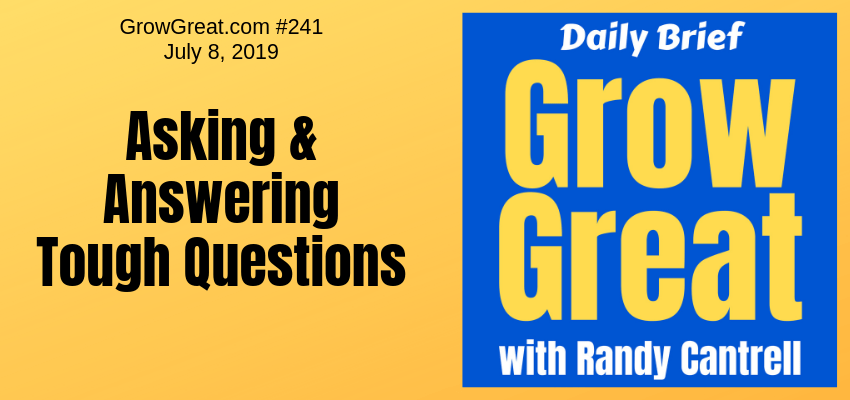Podcast: Play in new window | Download (Duration: 8:14 — 9.9MB)
Subscribe: Apple Podcasts | Spotify | RSS | More
When I was about 27 I uttered a statement one afternoon while my team was wrestling with some customer service challenges.
“The quality of our questions determines the quality of our business.”
The statement was provoked by our company’s inability to consistently deliver the experience I wanted. Dumb problems were frustrating me. Problems I felt we should easily avoid, but we weren’t avoiding them because we were failing to ask customers the proper questions.
We grabbed a stack of invoices that had problems attached, then we put them through a rigorous post-mortem. We met with each salesperson to review how the conversations went with the customer. And with teammates whose help might have been needed to complete the transaction.
Immediately it was clear what our problem was. We weren’t asking very good questions. The result? We weren’t getting clear enough answers and it was causing us to fail the customer.
That’s when I first uttered the phrase because it seemed so blindingly obvious to me. And to everybody else, too.
We quickly devised a series of questions – better questions – to improve our ability to give customers a consistently extraordinary experience!
Presto! It worked. Amazingly well. With tremendous consistency.
Our customer experience delivery shot up by quantum leaps and was ridiculously predictable. Very soon the exceptions were when we dropped the ball. We had turned things around by asking and answering tough (and even not-so-tough) questions.
I became a lifelong proponent for figuring out better questions to ask. And for deeper courage (if necessary) to answer them.
A few years earlier in my career, I had figured out that the “what if?” questions people were so fond of had a more practical benefit other than to serve as a brain game. This was especially true when asking worst-case-scenario questions.
“What’s the worst thing that can happen?”
Bravery is needed to answer it. Most people don’t answer it. They just ask it.
Rarely will the answer seem so plausibly likely. Sometimes people say, “It could kill me,” but that’s not the literal case. Worst case scenarios are infrequently the worst case. And even if they are, we can likely recover.
Tough questions aren’t about making people intentionally uncomfortable with some show of force, authority or power. They’re about helping us come face to face with clarity. It’s about digging deep enough to find the truth so we can fix a problem or seize an opportunity.
Some of the highest quality questions are personal. They deal with our lives, professionally and personally.
Be precise and specific.
For example, our quantum leap innovative idea was largely the result of figuring out how we could ask our customers better questions. We hadn’t been asking good questions. We were asking very non-specific questions that wouldn’t help us serve our customers better. Keep in mind the trifecta of business building: getting new customers, serving existing customers better and not going crazy in the process.
Part of our problem involved delivering items to our customers’ homes. Turns out we were asking customers, “Is there anything unusual about your delivery?”
Guess what their answer was 100% of the time.
“No.”
Of course. Nothing seemed unusual to them. It was their home. Never mind there were 100 steps up a 40-degree incline. They were used to it. It wasn’t unusual to them. Besides, who wants to admit there’s something unusual about their situation?
Then when our delivery team arrived and looked up at those 100 steps up a steep incline they were not happy. Sometimes ill-prepared, too.
Rather than ask a “YES” or “NO” question we modified the question. Here was our new question – more of a request actually.
Describe how we need to come into your house to make this delivery.
Customers would then tell us. “Well, you’re going to need to come through the front door. If the truck parks on the street there are about 100 steps up a pretty steep incline…”
Now we were able to ask deeper, more probing questions to get the delivery instructions just as precise as our questions. That precision made us more efficient, effective and gave us the opportunity to deliver a superior experience to every customer.
That’s the power of great questions. They foster greater answers.
It’s a busy week here so I’ve decided I’m going to step away from the podcast while I complete some important projects. This is your opportunity to go check out some of the back episodes. Or it’ll be your opportunity to stop listening for a little while so you can focus on your own important projects.
Be well. Do good. Grow great!
Randy
